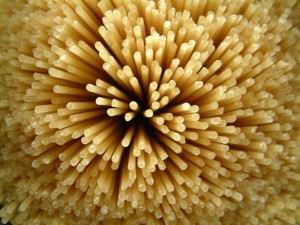 Yesterday ScienceDaily published an article about a study finding that people with addictive-like eating behavior have greater neural activity in certain regions of the brain, similar to substance dependence. The report will appear in the August issue of Archives of General Psychiatry.
Yesterday ScienceDaily published an article about a study finding that people with addictive-like eating behavior have greater neural activity in certain regions of the brain, similar to substance dependence. The report will appear in the August issue of Archives of General Psychiatry.
It has been proposed that addictive processes may be at work in the etiology of obesity due to the various parallels in neural functioning associated with substance dependence and obesity. Researchers at Yale University looked at the relationship between food addiction symptoms and neural activation (measured via functional magnetic resonance imaging) in response to cues signaling delivery of desirable food such as a chocolate milkshake, versus a tasteless control solution and then the actual consumption of a chocolate milkshake versus a tasteless solution. The study included 48 healthy young women of different weight ranges.
The findings were as predicted, elevated food addiction scores were associated with greater activation of regions that play a role in encoding the motivational value of stimuli in response to food cues. The study authors summarize that these findings support the theory that compulsive food eating may be driven in part by an enhanced anticipation of the rewarding properties of food. Similarly, drug addicted individuals are likely to be physiologically, psychologically, and behaviorally reactive to substance-related cues. If certain foods are addictive, this may in part explain the difficulty people experience in maintaining weight loss. If food cues act in a manner equivalent to drug cues, efforts to change the current food environment may be critical to successful weight loss and prevention efforts.
One school of thought involves the specific role of carbohydrates and addiction. We asked Dr. Rob Cywes, one of the nation’s leading bariatric surgeons and founder of Jacksonville Weight Loss Center, about his take on this study:
This article goes a long way in defining obesity as a consequence of an out of control destructive relationship called addiction. However, it is not possible to be addicted to food as a category, because all foods don’t get us high. Therefore, they need to refine the drug of choice of obese people. Ubiquitously, no one gets high on steak or lettuce or tomatoes or eggs or cheese or fish. These foods have nutritional value but not endorphin-releasing capacity. It is specifically carbohydrates, sugars and starches that get us high by releasing powerful endorphins. We chase the high, not the nutritional value and when we overeat to get high, along come the excess calories that make us fat. Obesity is an addiction, not to food, but more specifically, to sugars and starches. It is not possible to stop eating food, but it is possible to stop eating carbohydrates. Carbs aren’t bad – it is our relationship with them that is the issue, similar to alcoholism. Once the relationship is out of control, it is an addiction. This is why our office follows a carbohydrate addiction behavioral therapy model, and NOT a weight loss model.
Dr. Cywes also told us, “Our patients are already experts at failing weight loss programs, so why put them in another one with a band? The band loses the weight for you, but changing your relationship with carbs will change the cause of your obesity and you won’t be fat again.” Like many top bariatric surgeons, Dr. Cywes works with an entire team dedicated to the patient’s long term success. His team is comprised of a registered dietitian, licensed mental health counselor, exercise specialist, psychologist and weight loss counselor.






Nutrition & Lifestyle